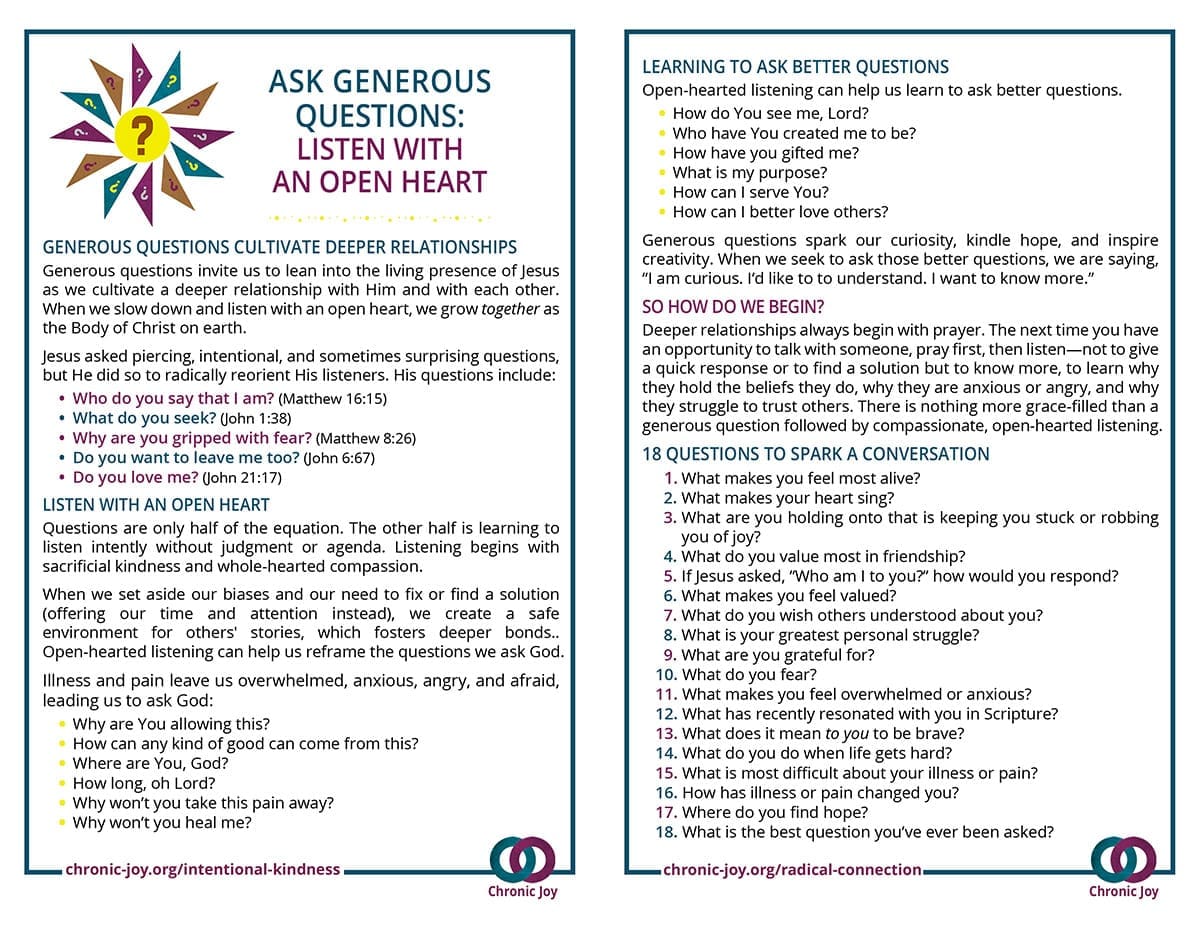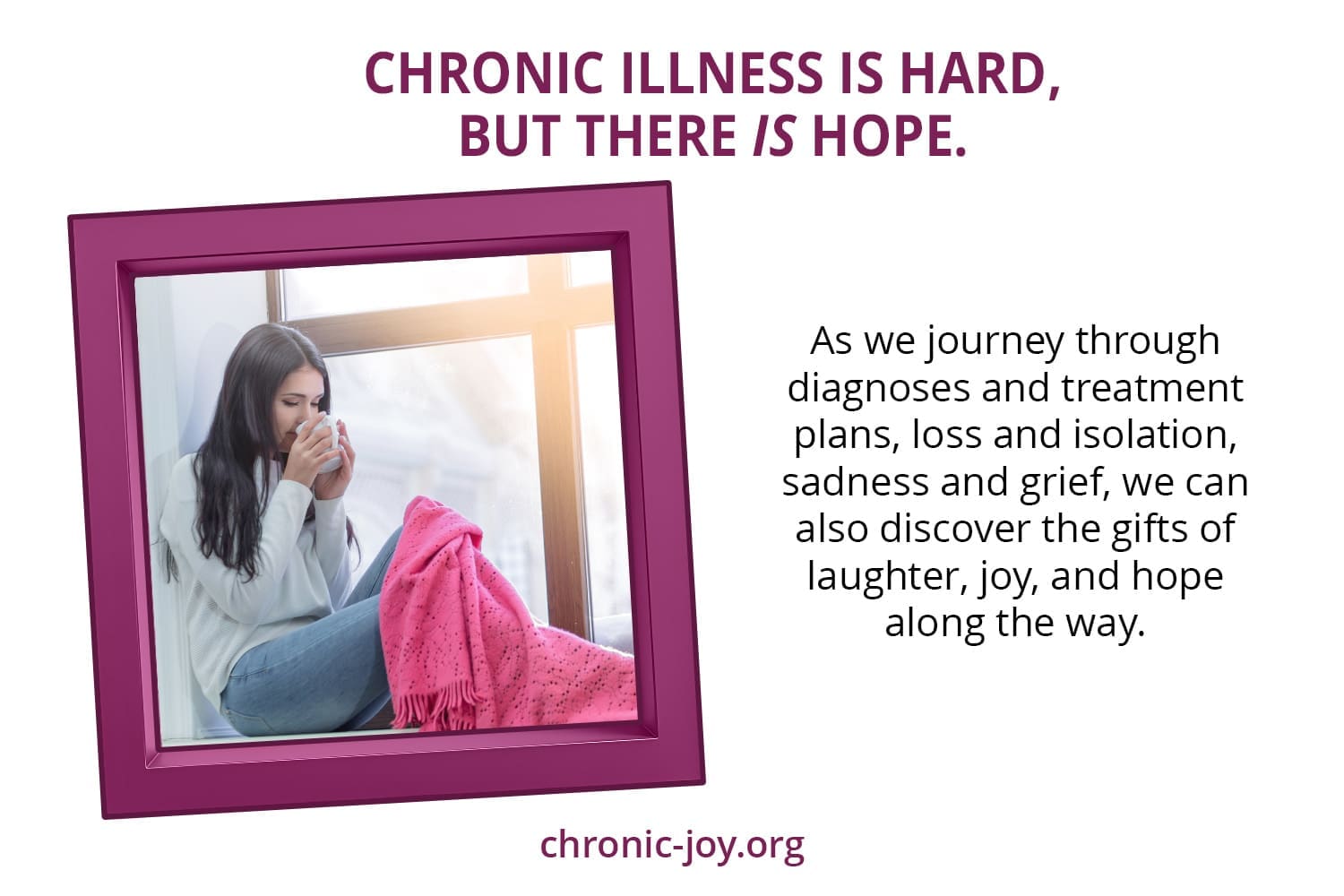
God has made me fruitful in the land of my suffering. (Genesis 41:52)
LET’S WALK ALONGSIDE THE CHRONICALLY ILL
Lisa was only 43 years old, but she felt 80. When doctors finally gave her a diagnosis for her chronic pain, she was relieved to know it wasn’t all in her head, yet the prospect of an incurable condition was very hard to accept.
She was obsessive about reading new articles and books and researching her condition online. Also, she tried every “cure” suggested, but nothing helped for long, and she had to fight feeling like a failure. Her husband had difficulty accepting that she wouldn’t get better and struggled with some of the “cures” (such as turning off the fuse in their bedroom at night so no electrical fields would jeopardize the proper polarization of the magnets his wife wore all over her body).
Well-meaning friends (who would suggest more prayer and healing services) made her ashamed that she wasn’t spiritual enough. Sadly, she stopped telling most people about her actual struggles because it seemed the more people she told, the more isolated she felt. She had to decline some social invitations, and then some people quit asking her altogether, which made her feel like an outcast.
BE AN UNDERSTANDING FRIEND
Only people in the church who understood suffering brought her comfort. She also found it encouraging to have a thorn in the flesh, through which she could more fully understand the pain Christ went through for us. She embraced the promise that He knows and empathizes with our pain. Holding on to the hope of God’s healing power while accepting not being healed and moving on with life’s plans was the most difficult balancing act Lisa had ever faced.
Healing no longer meant just the absence of suffering but peace, trust, and intimate sharing in Christ’s pain. It was the knowledge of being loved by those closest to her simply because of who she was, not because of what she could do. Healing also involved seeing the world differently ─ at a slower pace, noticing the beauty of the simplest things ─ and sharing a special knowledge in prayer for others hit by disaster or illness.
COMMON EXPERIENCES
What is it like to have a chronic illness like Lisa’s? Though chronic illness varies by the intensity of the impairment, common experiences still exist.
The chronically ill person:
- feels alone in the pain.
- grieves the many losses the impairment has caused.
- experiences the interpersonal tension others have in not knowing what to say or how to act around her.
- wants her own identity ─ not the identity of the disorder.
- feels ashamed of what she can’t do and the burden she is to others.
HOW YOU CAN MINISTER
Our society doesn’t deal well with chronic illness (an illness that is present all the time.). Even in our churches, we want quick fixes and answers to our prayers. We don’t know what to do with someone who is suffering long-term, so we avoid them or blame them for not taking better care of themselves. As a result, we miss the fire-tested wisdom and character of people who have identified with Christ in some agony of this sinful world. We do not honor Scripture’s statement that all creation groans (Romans 8:22).
Like Lisa, chronically ill people are the same as anyone else. We need to let them be regular members of the church family. We all need a strong sense of belonging and to experience God’s love, tenderness, and forgiveness ─ and we all need to mature in having God’s perspective on this world and eternity. Let’s help those with chronic illness realize their true value, enabling them to receive love, give love, and use their spiritual gifts to God’s glory. How might we do that?
- Empathize. Draw the person out. Enter their world and seek to understand.
- Enter and expand their world. Share your life ─ the mundane, the humorous, and your burdens.
- Encourage their spirit. Pray with them, read Scripture, e-mail or text an inspiring quote.
- Ask for their advice on life issues. They’ve been through a lot.
- Don’t avoid them. Include them. Let them say “no” to invitations or leave events early.
- Don’t only talk about the illness. Keep this in mind, especially if you see them often. Talk about the news and church issues.
- Set limits and boundaries. Limit the amount of caregiving time you have (so you don’t burn out). For example, if they call often, tell them you only have five minutes to talk. Be willing to do what you can for them, but keep it reasonable so you can continue to be their friend.
By following these suggestions, you can help comfort and minister to your hurting friends – and let them know they are not alone.

INGRID LAWRENZ
Licensed Independent Clinical Social Worker
Ingrid is a ministry wife in Brookfield, WI. Using her Master’s in Social Work, Ingrid has worked as a clinical social worker at a Christian outpatient mental health clinic. She and her husband, Mel, have two children.
Chronic Illness
As we journey through diagnoses and treatment plans, loss and isolation, sadness and grief, we can also discover the gifts of laughter, joy, and hope along the way.

Ask Generous Questions: Listen with an Open Heart
Lean into the living presence of Jesus and cultivate a deeper relationship with one another. When we slow down and listen to each other, we grow together as the Body of Christ on earth.


Recent Comments